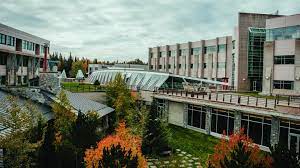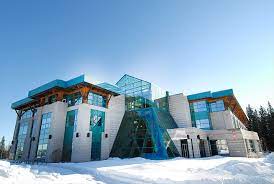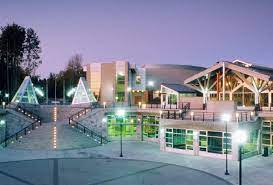Choosing the right university is a crucial decision for any student seeking higher education. Among the reputable institutions in Canada, the University of Northern British Columbia (UNBC) stands out as a top choice.
If you’re considering applying to UNBC for the year 2023, it’s important to have a clear understanding of the university’s acceptance rate, admission requirements, scholarships, and tuition.
The University of Northern British Columbia (UNBC) is a reputable Canadian university located in the province of British Columbia. Established in 1990, UNBC is known for its focus on research, community engagement, and providing high-quality education to its students.
The university has two main campuses: the Prince George campus and the Terrace campus, with additional regional campuses in Quesnel, Fort St. John, and South-Central British Columbia.
UNBC offers a wide range of undergraduate and graduate programs across various disciplines, including arts, sciences, business, health sciences, engineering, and natural resources management.
The university’s small class sizes and low student-to-faculty ratio enable personalized attention and foster a supportive learning environment.
In this blog post, we will explore these key aspects to help you make an informed decision about your educational journey at UNBC.
Table of Contents
Why UNBC?

One of UNBC’s distinctive features is its commitment to research and innovation. The university is home to several research institutes and centers focusing on areas such as natural resources and environmental studies, health research, and social innovation.
UNBC’s faculty members are actively involved in research projects and provide students with opportunities to engage in research activities, contributing to knowledge creation and practical solutions for real-world challenges.
UNBC is renowned for its commitment to sustainability and environmental stewardship. The university incorporates sustainability principles across its operations and academic programs.
It has received various awards and recognition for its sustainability initiatives, including being named Canada’s Green University by Corporate Knights in 2019.
Beyond academics, UNBC offers a vibrant campus life with a range of extracurricular activities, clubs, and sports teams. Students have opportunities to get involved in student organizations, participate in community service, and engage in cultural and recreational activities.
The close-knit community at UNBC fosters a sense of belonging and encourages students to explore their interests and develop leadership skills.
As a regional university, UNBC plays a vital role in serving the northern regions of British Columbia, providing access to higher education and contributing to the socio-economic development of the area.
The university’s strong partnerships with local industries, government agencies, and indigenous communities facilitate collaborative research, experiential learning, and community-based initiatives.
Admission Requirements

To be considered for admission to UNBC, prospective undergraduate students must meet certain academic requirements. The general admission requirements include:
- High School Diploma or equivalent: Applicants should have successfully completed their secondary education or an equivalent qualification.
- English Language Proficiency: If English is not your first language, you may need to provide proof of proficiency through standardized tests such as the TOEFL or IELTS.
- Program-Specific Requirements: Certain programs may have additional prerequisites or specific grade requirements. It’s important to review the program-specific requirements on UNBC’s official website for detailed information.
Acceptance Rate
The acceptance rate at the University of Northern British Columbia varies from year to year and depends on several factors such as the number of applications received, available spaces, and the competitiveness of the applicant pool.
As of 2021, UNBC’s acceptance rate was approximately 70%. It is worth noting that meeting the minimum requirements does not guarantee admission, as UNBC follows a holistic approach in reviewing applications.
Scholarships
UNBC offers several scholarships and financial aid opportunities to support students in their academic pursuits. These scholarships recognize academic achievement, community involvement, leadership potential, and more.
The university’s scholarship program includes entrance scholarships for incoming students, in-course scholarships for current students, and scholarships for graduate students.
To be eligible for scholarships, applicants usually need to demonstrate outstanding academic performance and meet specific criteria.
It’s highly recommended to review the available scholarships and their respective application deadlines on UNBC’s official website.
UNBC Tuition
Tuition fees at UNBC vary depending on factors such as the program of study, student status (Canadian or international), and course load.
As of 2021, undergraduate Canadian students paid an average of around CAD 6,900 to CAD 7,300 per academic year for a full-time course load. International students generally have higher tuition fees, ranging from approximately CAD 19,800 to CAD 23,800 per academic year.
It’s important to note that these figures are subject to change, so it’s advisable to consult UNBC’s website or directly contact the university’s admissions office for the most up-to-date tuition information.
Conclusion
If you’re considering the University of Northern British Columbia as your educational destination in 2023, it’s essential to familiarize yourself with the acceptance rate, admission requirements, scholarships, and tuition fees.
University of Northern British Columbia is a respected institution that offers a comprehensive academic experience, emphasizing research, community engagement, and sustainability.
With its diverse program offerings, supportive learning environment, and commitment to innovation, UNBC provides students with an excellent foundation for personal and professional growth.
UNBC offers a diverse range of academic programs and provides numerous opportunities for students to excel in their chosen fields.
Remember to carefully review the official UNBC website and connect with the university’s admissions office for the most accurate and up-to-date information regarding your specific circumstances.
Best of luck with your educational journey at UNBC!
Frequently Asked Questions
Where is the University of Northern British Columbia located?
The University of Northern British Columbia (UNBC) is located in the province of British Columbia, Canada. It has two main campuses: the Prince George campus and the Terrace campus. There are also regional campuses in Quesnel, Fort St. John, and South-Central British Columbia.
What programs does UNBC offer?
UNBC offers a wide range of undergraduate and graduate programs across various disciplines. These include arts, sciences, business, health sciences, engineering, natural resources management, education, and more. Students can pursue bachelor’s, master’s, and doctoral degrees in their chosen fields of study.
Are there scholarships available at UNBC?
Yes, UNBC offers scholarships and financial aid opportunities to support students in their academic endeavors. These scholarships recognize academic achievement, leadership potential, community involvement, and other criteria. UNBC’s scholarship program includes entrance scholarships for incoming students, in-course scholarships for current students, and scholarships for graduate students. It’s recommended to visit the university’s official website for detailed information on available scholarships and their respective application processes.
What are the research opportunities at UNBC?
UNBC has a strong emphasis on research and offers numerous opportunities for students to engage in research activities. The university is home to several research institutes and centers focused on various disciplines and areas of study, such as natural resources and environmental studies, health research, and social innovation. Students can work alongside faculty members on research projects and contribute to advancements in their fields of interest.






